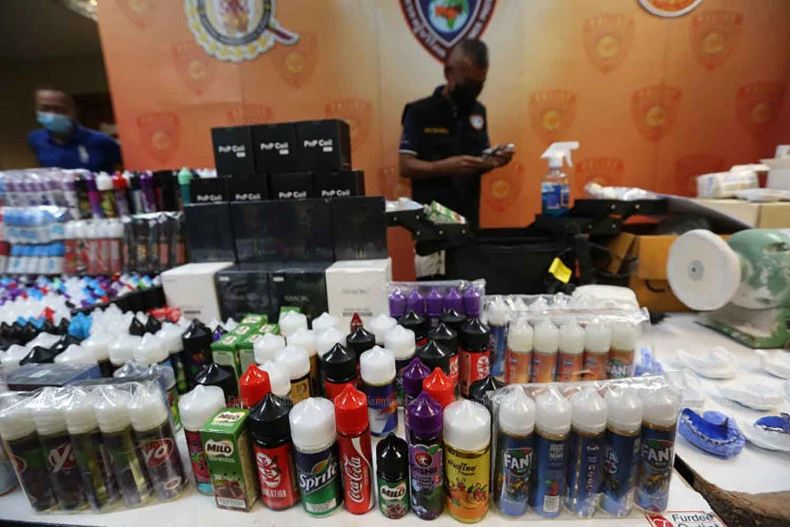您的购物车目前是空的!

Amid growing concerns over youth vaping, a committee in Thailand’s House of Representatives has called for stronger measures to enforce the country’s ban on e-cigarettes. The move comes as authorities struggle to curb the widespread availability of illegal vaping products, particularly among minors.
Key Points from the Committee’s Proposal
🚨 Concerns Over Youth Vaping
The House Committee on E-cigarette Regulation expressed alarm over reports of e-cigarettes being marketed to young people. Despite Thailand’s ban on e-cigarettes, these products are being smuggled into the country in packaging designed to resemble candy or other appealing items.
Opas Almaseri, the committee’s spokesperson, stated:
- “This is very concerning. These products are misleadingly marketed as friendly items, and young people may perceive them as harmless.”
🛑 Calls for Stronger Enforcement
While acknowledging the efforts of law enforcement agencies to crack down on e-cigarettes, Opas emphasized that more needs to be done. He said:
- “We need more effective control measures to address legal loopholes and protect consumers, especially children and teenagers.”
📜 Proposed Measures
The committee has recommended several measures to strengthen the e-cigarette ban, including:
- Tighter restrictions on e-cigarette imports.
- Stricter enforcement of existing laws.
- Enhanced public awareness campaigns to educate parents and children about the dangers of vaping.
Customs Efforts to Combat Smuggling
🛃 Proactive Measures by Customs
Opas praised the Customs Department for its proactive efforts to intercept smuggled e-cigarettes. From October 2024 to January 2025, customs officials seized illegal e-cigarettes and cigarettes worth over 28 million baht (approximately $780,000).
🔍 Challenges in Enforcement
Despite these efforts, the widespread availability of illegal e-cigarettes highlights the challenges of enforcing the ban. Smugglers often use creative packaging and online platforms to evade detection, making it difficult for authorities to completely eliminate the problem.
Broader Implications for the Vaping Industry
The committee’s push for stricter measures reflects a global trend of increasing regulatory scrutiny on e-cigarettes. For manufacturers, distributors, and retailers, this presents both challenges and opportunities:
1. Regulatory Compliance
Companies must ensure their products comply with local laws, including age restrictions and marketing practices, to avoid penalties and maintain market access.
2. Shift Toward Harm Reduction
As governments crack down on illegal e-cigarettes, there is an opportunity to promote harm reduction products that meet regulatory standards and provide safer alternatives for adult smokers.
3. Consumer Education
Educating consumers about the risks of illegal e-cigarettes and the importance of purchasing regulated products can help reduce demand for illicit goods.
4. Impact on Independent Sellers
Independent sellers, particularly those involved in the wholesale of disposable e-cigarettes, must adapt to stricter regulations and ensure their products are sourced from legitimate manufacturers.
Conclusion
Thailand’s House Committee on E-cigarette Regulation is taking a strong stance against youth vaping, advocating for stricter enforcement of the country’s e-cigarette ban. While the proposed measures aim to protect young people, they also highlight the challenges of regulating a rapidly evolving market.
For the vaping industry, this serves as a reminder of the importance of compliance, innovation, and responsible marketing practices. As the debate continues, stakeholders must work together to find balanced solutions that prioritize public health without stifling harm reduction efforts.
Latest Posts
- The Truth About Vaping: Health Risks of E-Cigarettes and Fruit Flavored Vape Products

- Russia’s New Vape Retail Licensing System: What It Means for the Global E-Cigarette Industry

- U.S. Supreme Court Upholds FDA’s Ban on Flavored Vapes: What It Means for the E-Cigarette Industry

- Vaping in Classrooms: UK Teachers Report Growing Epidemic Among Schoolchildren

- UK Authorities Seize £26,000 in Illegal Vapes & Tobacco: Crackdown Intensifies on Unregulated E-Cigarette Trade




